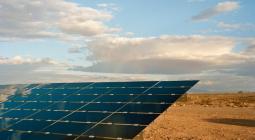Green New Deal vs. Carbon Tax: A Clash of 2 Worldviews, Both Seeking Climate Action
Congress is in uncharted territory on climate policy.
For the first time ever, lawmakers face competing approaches to reviving U.S. climate action. And despite hostility from the White House, each has significant support and the potential to shape the 2020 elections.
On one side are the student activists of the Sunrise Movement and Congress's new young firebrands; on the other, more moderate groups, including grassroots advocates and some of the Republican Party's elder statesmen, supported both by established environmental groups and by major energy corporations.
The young activists want nothing short of a social and economic revolution. Their Green New Deal, while not yet fully formed, promises jobs and economic security as part of a drive to get greenhouse gas emissions to net zero. The moderates, hoping to win over Republicans in Congress, seek a market-based incentive in the form of a carbon tax plan. But key to energy industry support for their efforts is that any carbon pricing proposal also include protection from other regulations on emissions and immunity from climate lawsuits.
Supporters of these two worldviews have been jockeying for position largely behind the scenes for years as Congress and powerful industries blocked climate policies. Now, they are competing in the limelight as they seek to counter President Donald Trump's promotion of climate denial in the face of increasingly dire warnings of scientists and portents of nature.
"Things are very different in the climate space on a number of fronts," said Lou Leonard, senior vice president for climate change and energy at the World Wildlife Fund. "The impacts of climate change are coming faster than even the scientists a few years ago thought. It has changed the way the public thinks about this. And even here in the crazy bubble of Washington, D.C., if you're clear-eyed at all, you see the way the conversation has been in Washington is not tenable."
This contest between two worldviews could also end with a compromise that brings together pieces of each plan, marrying pragmatism with idealism.
"We now are really at a point where there are robust and very forward-looking conversations happening," said Derek Walker, vice president for U.S. climate at the Environmental Defense Fund (EDF).
The group has spoken favorably about both the Green New Deal and carbon pricing, which the market-oriented EDF has long espoused.
"Those things on the surface don't resemble each other all that much," Walker said, "except in their recognition that boldness and ambition in this space is essential."
Outlines of a Green New Deal
The defining feature of the Green New Deal is its breathtaking ambition. It seeks a 10-year mobilization of investment across the economic landscape intended to reach the science-based climate goal of cutting net emissions of greenhouse gases to zero as rapidly as possible. No deadline is set and no energy technologies are specified or ruled out in the resolution introduced by Rep. Alexandria Ocasio-Cortez (D-N.Y.) and Sen. Edward Markey (D-Mass.)
The proposal foresees the federal government spearheading projects to build climate resilience, to repair and upgrade the nation's infrastructure, to deploy "smart grid" technology, to reduce emissions in manufacturing, farming and ranching, to overhaul transportation and more. Like the original New Deal of the 1930s, it would require many separate pieces of legislation. And it would be integrated with sweeping economic policy, including guaranteed jobs and health care for all Americans.
As a political strategy, the Green New Deal is about forcing politicians who have put climate change on the back burner to move it front and center in the political discussion—especially the 2020 presidential race.
So far, all the declared Democratic presidential candidates in the Senate have chosen to co-sponsor the resolution. But other leading Democrats have chosen not to, including Sen. Sheldon Whitehouse (D-R.I.), an outspoken champion of climate action, and Sen. Dianne Feinstein (D-Calif.), who was captured on video scolding young Sunrise Movement activists for their insistence on a plan that she said had no hope of Senate passage and that there was "no way to pay for."
Hard-line GOP opponents of climate policies have sought to caricature the Green New Deal as a socialist pipe dream.
Senate Majority Leader Mitch McConnell (R-Ky.) considered trying to spike the Green New Deal resolution through a vote without any debate, but he has so far held off, leaving the proposal to continue to shape debate on climate, energy and economic policy on Capitol Hill.
Veterans of the fight for climate action say the all-hands-on-deck urgency, sweeping scale and net-zero-emissions goal of the Green New Deal is precisely in line with what science shows is necessary to stave off the worst effects of climate change.
"We are very enthusiastic, and very supportive of the resolution and the goal of 100 percent clean energy as defined in the bill—as net-zero emissions," said David Doniger, senior strategic director of the Climate and Clean Energy Program at the Natural Resources Defense Council. If Congress treats the resolution as an articulation of goals, he said, "and says now let's develop the proposals to move us toward those goals, it can be very constructive."
Green New Dealers have stressed that they have not yet settled on any single approach for cutting carbon emissions. Ocasio-Cortez tweeted that the resolution she and Markey introduced was more of a "request for proposals" than a proposal. "When people say, 'What about this? What about that?,' The answer is that is part of the solution. The solution is not going to come from one congresswoman from the Bronx. It's from everyone working on this together."
That means the market-based ideas put forth by political establishment figures are not off the table, explained Benjamin Finnegan, 22, of Philadelphia, a spokesman for the Sunrise Movement.
"The door is not closed to cap and trade and carbon taxes, and all that stuff," he said. "The important thing is that carbon taxes are simply not enough. What is needed to avert the climate crisis is a massive restructuring and mobilization—an overhaul of our economy and society the likes of which has not been seen since World War II."
Carbon Tax Plans, With Some Key Differences
The carbon tax supporters envision far less federal involvement and a free-market approach to drive down emissions.
There are competing proposals. One approach is backed by the grassroots advocacy groupCitizens' Climate Lobby (CCL); it has been introduced in the House by Rep. Ted Deutch (D-Fla.) and two Republican members of a bipartisan climate caucus that CCL helped to build.
The other approach was designed by Republican elder statesmen including former Secretaries of State James Baker and George Shultz; it is backed by a coalition of big corporations and environmentalists called the Climate Leadership Council, which is hoping to see Republican-sponsored legislation introduced in the Senate by summer.
The grassroots-focused CCL and the establishment Climate Leadership Council laud each other's work, and there is much that their plans share. Both would put an escalating tax on carbon-based fuels like gasoline and coal—costs that would be passed along to consumers at the gas pump and on their utility bills to encourage consumers and investors to choose cleaner energy. All the tax revenue collected would go back to American households in dividends, or monthly rebate checks. Both plans would include a border tax adjustment—an incentive for countries that trade with the United States to also act to cut carbon emissions.
But there are also differences.
The CCL plan would have a more sharply increasing tax, and it would keep in place many other measures to curb greenhouse gases. The legislation the establishment Climate Leadership Council wants to see introduced in the Senate would eliminate other regulations on greenhouse gases and set limits on climate lawsuits, provisions that are crucial to the energy industry's support.
ExxonMobil has pledged $1 million and ConocoPhillips, $2 million, to the Climate Leadership Council's political lobbying arm, Americans for Carbon Dividends. Former Senate Majority Leader Trent Lott, a Republican, and former Sen. John Breaux, a Louisiana Democrat, chair the lobbying effort.
"You're seeing a lot of Republicans who want to engage and be part of a solution," said former Rep. Ryan Costello, who took over as managing director of Americans for Carbon Dividends after retiring from Congress earlier this year. "I think the politics of this are going to be, for many Republicans, is it sufficient to just look at what the far left want to do and call it crazy? Or is that going to be insufficient? Are they going to have to offer their own policy framework with which to address the issue?
Costello, a Republican, said the group's hope is that its proposal will also appeal to centrist Democrats, especially those seeking an alternative to the Green New Deal.
"Without knowing what it is, I'm certainly not going to be critical," Costello said of the Green New Deal. "But if the framework is all renewables, no nuclear, no hydro, no natural gas—number one, I'd argue that is not commercially feasible. And number two, I think you're going to lose a fair amount of Democrats on that."
The Climate Leadership Council early this year organized a consensus statement of the nation's leading economists backing their plan. It was signed by all four living former chairs of the Federal Reserve, 27 Nobel Laureates, and the former top economic advisers to all six presidents after Richard Nixon and before Trump.
"It shows broad agreement among economists and experienced policymakers that carbon dividends is the most cost-effective, equitable and politically-viable climate solution," said Janet Yellen, until recently the Fed's chair, calling it "a major tipping point."
It also showed the star power that the Climate Leadership Council can recruit. "They have access," said Mark Reynolds, executive director of the grassroots-focused Citizens' Climate Lobby (CCL). "Their approach is you get the people whose voices have enormous credibility, particularly on the right."
The Climate Leadership Council's vision is that today's big energy companies will continue to be around; they shouldn't be drained fighting over damages, but they should be providing needed investment in the transition to clean energy.
It's a future, in other words, that seems at odds with the ideals of the Green New Deal activists, who Finnegan said will oppose legislation that offers a lifeline to the businesses responsible for carbon emissions. "We absolutely don't support anything that cements the existence of the fossil fuel industry," he said.
Is There Room for Compromise?
The clash of ideologies shows the difficulties that either approach will face in Congress, where bipartisan support likely will continue to be needed to reach 60 votes in the Senate no matter what happens in 2020.
But some supporters of climate action believe that there's enough common ground between the carbon tax and Green New Deal advocates to serve as the foundation for a cohesive climate policy.
Even the language of the Green New Deal resolution—the goal of achieving "net zero" greenhouse gas emissions—allows for continued fossil fuel use, if emissions are offset or captured. Nuclear, hydropower and fossil fuel with carbon capture are all included in onedetailed roadmap for a Green New Deal developed by the movement's supporters at the think tank Data for Progress.
The obvious nexus between the Green New Deal and a carbon tax plan is money. The Green New Deal will require a lot of it, and a per-ton tax on the 5.4 billion metric tons of carbon generated by the U.S. economy each year would generate a lot.
That's not been lost on some Green New Deal supporters.
Sen. Kirsten Gillibrand (D-N.Y.), a co-sponsor of the Green New Deal resolution and a candidate for president, says she also supports a carbon tax. Former Rep. John Delaney (D-Md.), who has cast himself as a centrist dark horse in the field of Democratic presidential contenders, has taken the position that "a carbon tax should be the centerpiece of the Green New Deal."
Ocasio-Cortez, however, has rejected the idea that Green New Dealers need to identify a funding source to pay for what she sees as much as a duty of the federal government as support of the military.
"Part of this really is examining the role of government and what government is for," Ocasio-Cortez said.
On the other side, the industry-backed Americans for Carbon Dividends balks at the idea of using the revenue from its carbon tax proposal for anything but rebates returned to citizens. "That's how you keep conservatives on board," Costello said. "I think if you don't lock that in, you are going to have everybody's wish list become part of the sausage-making process here."
The most important question of all is whether an accord can ever be reached that has enough support from both parties to address the monumental challenge of eliminating carbon emissions by mid-century.
"We realize some amount of compromise is necessary to reach a final deal when the time comes," said Leonard, of the World Wildlife Fund, who is both supportive of the Green New Deal and has joined in the Climate Leadership Council's carbon tax effort. "The ultimate question is the environmental integrity and ambition of the proposal. We know we need to get to net zero by mid-century to stay in the range of what the Paris Agreement calls for. You don't sacrifice where you need to be on climate."
4 March 2019





